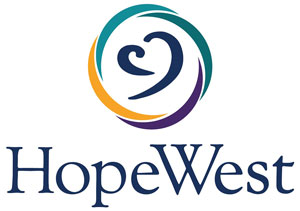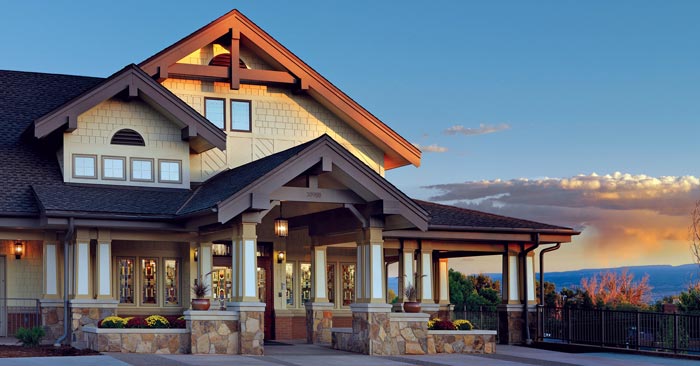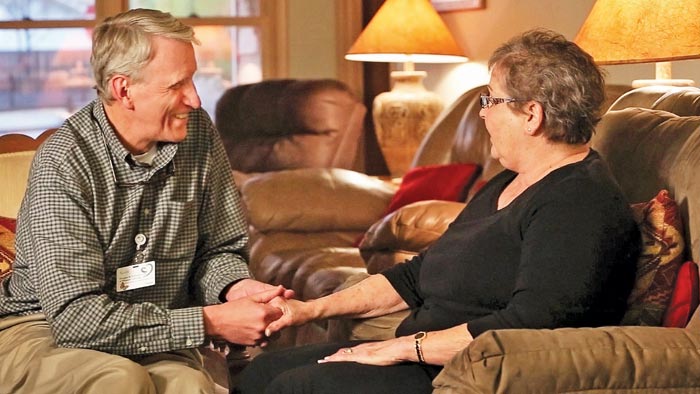HopeWest
- Need: To provide accessible and affordable services to address the challenges associated with aging, serious illness, and grief across rural western Colorado.
- Intervention: A nonprofit, community-sustained healthcare model was created to provide the Program of All-Inclusive Care for the Elderly (PACE), dementia support, hospice care and palliative care, as well as grief support services for individuals of all ages.
- Results: Since 1993, HopeWest has grown to serve more than 3,000 patients and families annually across five counties in western Colorado.
Description
 HopeWest
is a vital nonprofit hospice organization in western
Colorado, serving Mesa, Delta, Montrose, Ouray, and Rio
Blanco counties. They offer hospice and palliative care
to individuals in hospitals, nursing homes, personal
homes, and at the HopeWest Ferris Hospice Care Center.
Grief support programs are available for adults, teens,
and children. HopeWest also offers PACE (Program of
All-Inclusive Care for the Elderly), a comprehensive care
program for residents over the age of 55 who meet the
necessary level of care criteria in addition to living
within a specified service area. They also provide
dementia support through their participation in CMS's
Guiding an Improved Dementia Experience (GUIDE) Model
program. This program includes home-based services,
respite, and other tools and resources for people living
with dementia and their unpaid caregivers.
HopeWest
is a vital nonprofit hospice organization in western
Colorado, serving Mesa, Delta, Montrose, Ouray, and Rio
Blanco counties. They offer hospice and palliative care
to individuals in hospitals, nursing homes, personal
homes, and at the HopeWest Ferris Hospice Care Center.
Grief support programs are available for adults, teens,
and children. HopeWest also offers PACE (Program of
All-Inclusive Care for the Elderly), a comprehensive care
program for residents over the age of 55 who meet the
necessary level of care criteria in addition to living
within a specified service area. They also provide
dementia support through their participation in CMS's
Guiding an Improved Dementia Experience (GUIDE) Model
program. This program includes home-based services,
respite, and other tools and resources for people living
with dementia and their unpaid caregivers.
Founded in 1993, HopeWest emphasizes the integration of PACE, dementia support, hospice, palliative care, and grief services. By working with local physicians, nursing home providers, community partners and families, they tailor programs to meet the individual needs of each rural community they serve. HopeWest is headquartered in Grand Junction but maintains offices in four surrounding rural counties.
HopeWest also operates three Heirlooms for Hospice resale stores, in addition to Spoons bistro & bakery, located at the Ferris Hospice Care Center. All proceeds from these entities support HopeWest.

The Ferris Hospice Care Center provides a comfortable environment for patients who can no longer be at home but would rather not be hospitalized. The Center for Living Your Best in Grand Junction is home to the PACE program, a clinic, and a grief support center.
HopeWest is supported by a robust and dedicated volunteer base. In 2024, 1,085 volunteers contributed a total of 82,276 hours. Volunteers provide companionship for patients and families, assist with grief support groups, help with music and art projects, greet customers at Heirlooms for Hospice, and much more.
Services offered
HopeWest provides care through the following key programs:
- Hospice care in a variety of settings
- Palliative care program designed to suit a variety of patient needs
- PACE care coordination for qualifying seniors
- Grief support programs for adults, teens, and children
- Dementia support for Medicare beneficiaries diagnosed with any form of dementia and their caregivers

Results
HopeWest provides care to more than 3,000 patients and participants across 10,000 square miles throughout the Western Slope of Colorado each year. HopeWest offers access to care for patients in frontier communities and remote areas, who may have no insurance, or who have needs which are not covered by Medicare.
HopeWest, a 4-star hospice organization in western Colorado, earned the Hospice CAHPS Honors Award for 2024. This award celebrates the highest-performing hospice agencies in the nation for continuously going above and beyond.
The Grand Junction Area Chamber of Commerce named HopeWest the 2023 Business of the Year, stating: "Our community would not only feel the loss of this organization in all corners of the Valley, it would not be the community it is today without it." HopeWest was named "Best Nonprofit," "Best Volunteer Group," "Best In-Home Health Care," and "Best Local Fundraising Event" by the Grand Junction Daily Sentinel in 2025, and "Best Nonprofit" and "Best Place to Work" by the Delta County Independent in 2024.
Spoons bistro & bakery was recognized as a "Best of the West" in 2025 by the Grand Junction Daily Sentinel. Heirlooms was named "Best Thrift Store," "Best Furniture Store," and "Best Downtown Store" in 2025 by the Grand Junction Daily Sentinel and "Best Consignment Store," "Best Customer Service," and "Best Furniture Store" in 2024 by the Delta County Independent.
Challenges
Some barriers HopeWest has encountered include:
- Financial burdens of CMS data submission, regulatory compliance, and payment reform
- Competition from large, privately-owned, publicly traded hospice companies with greater net margins
- Workforce shortage
- As the realities of inflation take effect, reliance is placed on the generosity of community partners
- Lacking the financial protections that rural hospitals enjoy– such as designations like Critical Access Hospital, Disproportionate Share Hospital, or Sole Community Provider
Replication
HopeWest staff believe one key to their success is their commitment to connecting on a personal level with the residents of each community they serve. With dedicated volunteers, collaborative clinical partnerships, and the generosity of donors who believe in their work, HopeWest attributes their ability to innovate and adapt to meet the evolving needs of their communities to a foundation of team work.
Contact Information
Deena Silva, President and CEOHopeWest
970.241.2212
info@HopeWestCO.org
Topics
Community engagement and volunteerism
· Dementia
· Fundraising
· Hospice and palliative care
· Networking and collaboration
States served
Colorado
Date added
March 24, 2015
Suggested citation: Rural Health Information Hub, 2025 . HopeWest [online]. Rural Health Information Hub. Available at: https://www.ruralhealthinfo.org/project-examples/789 [Accessed 22 February 2026]
Please contact the models and innovations contact directly for the most complete and current information about this program. Summaries of models and innovations are provided by RHIhub for your convenience. The programs described are not endorsed by RHIhub or by the Federal Office of Rural Health Policy. Each rural community should consider whether a particular project or approach is a good match for their community’s needs and capacity. While it is sometimes possible to adapt program components to match your resources, keep in mind that changes to the program design may impact results.
